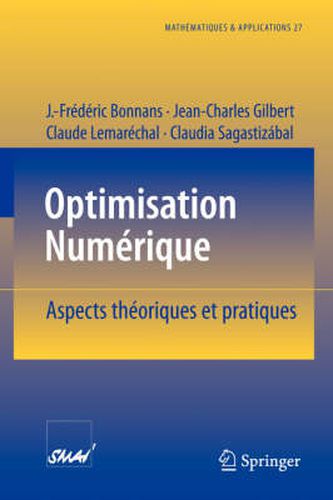Readings Newsletter
Become a Readings Member to make your shopping experience even easier.
Sign in or sign up for free!
You’re not far away from qualifying for FREE standard shipping within Australia
You’ve qualified for FREE standard shipping within Australia
The cart is loading…






This title is printed to order. This book may have been self-published. If so, we cannot guarantee the quality of the content. In the main most books will have gone through the editing process however some may not. We therefore suggest that you be aware of this before ordering this book. If in doubt check either the author or publisher’s details as we are unable to accept any returns unless they are faulty. Please contact us if you have any questions.
Ce livre est exclusivement consacre aux algorithmes numeriques d'optimisation (quasi-Newton, faisceaux, programmation quadratique successive, points interieurs); les bases theoriques (conditions d'optimalite, multiplicateurs de Lagrange) sont supposees connues. Son but est de familiariser le lecteur avec ces algorithmes, qui sont pour la plupart bien classiques. Leur description insiste sur leur implementation numerique, ils peuvent etre programmes directement par un lecteur experimente. Le cote theorique n'est pas pour autant neglige, avec demonstration de chaque theoreme de convergence ou vitesse de convergence; souvent, ces demonstrations utilisent des hypotheses minimales.
$9.00 standard shipping within Australia
FREE standard shipping within Australia for orders over $100.00
Express & International shipping calculated at checkout
This title is printed to order. This book may have been self-published. If so, we cannot guarantee the quality of the content. In the main most books will have gone through the editing process however some may not. We therefore suggest that you be aware of this before ordering this book. If in doubt check either the author or publisher’s details as we are unable to accept any returns unless they are faulty. Please contact us if you have any questions.
Ce livre est exclusivement consacre aux algorithmes numeriques d'optimisation (quasi-Newton, faisceaux, programmation quadratique successive, points interieurs); les bases theoriques (conditions d'optimalite, multiplicateurs de Lagrange) sont supposees connues. Son but est de familiariser le lecteur avec ces algorithmes, qui sont pour la plupart bien classiques. Leur description insiste sur leur implementation numerique, ils peuvent etre programmes directement par un lecteur experimente. Le cote theorique n'est pas pour autant neglige, avec demonstration de chaque theoreme de convergence ou vitesse de convergence; souvent, ces demonstrations utilisent des hypotheses minimales.